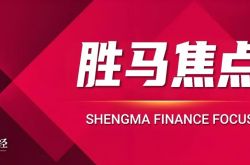Musk and the AI Guru Spar! When experts clash, every move is indeed deadly...
![]() 06/04 2024
06/04 2024
![]() 790
790
Editor: Caiyun
Recently, two heavyweights in the AI field have been engaging in a heated online argument, with the tensions rising.
One side is Yann LeCunn, the Turing Award winner and Chief AI Scientist at Meta; the other is Elon Musk, the world's richest man who has ventured into multiple key industries. Their online spat has been intense, with each refusing to back down, escalating the conflict.
You call me a "vile capitalist with poor character," and I call you "ineffectual and unlearned." The sparring in the tech circle is quite entertaining.
As usual, let's first understand the entire story. The incident stemmed from a job advertisement posted by the universe-level internet celebrity, Musk.
Recently, Musk was in a good mood due to some good news and secured a whopping $6 billion in funding for his xAI. With the money in hand, Musk's first thought was to recruit talent. He acted swiftly and soon posted an online status seeking talent from all quarters.
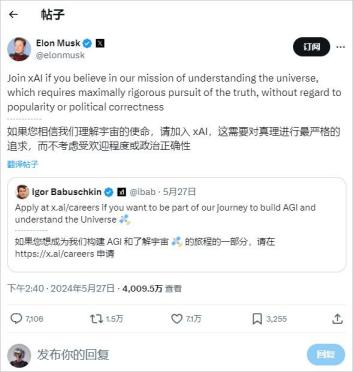
Surprisingly, this job advertisement drew "sarcastic" comments from LeCunn. He directly mocked Musk under his status, "If you can tolerate such a boss, then join xAI. This boss claims that what you are doing will be replaced by AI next year (no pressure); claims that what you are doing will destroy humanity and must be stopped or paused (yay, a six-month vacation!); claims to want to pursue the strictest truth, yet spreads crazy conspiracy theories on his social platform." At the same time, LeCunn also mocked Musk's self-proclaimed stance as a firm supporter of free speech, accusing him of spreading unverified information on X: In March this year, X removed a post shared by Musk due to its violation of platform rules.
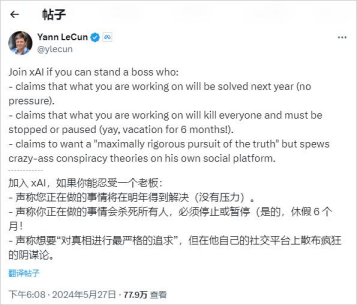
Daring to confront the world's richest man and a universe-level internet celebrity, LeCunn is no nobody. Known as the "AI Guru," LeCunn is Meta's Chief Scientist, a Turing Award winner, and a professor at New York University. In 2018, he and former Google Vice President Geoffrey Hinton, as well as Professor Yoshua Bengio from the University of Montreal, jointly received the Turing Award and are collectively known as the "Three Giants of Deep Learning." In terms of credentials and expertise, he is fully qualified to compete with Musk.
Musk retorted by calling the other party a "softie," and the feud drew the attention of 30 million netizens.
Naturally, Musk would not let LeCunn's mockery go unanswered.
Some onlookers initially expressed confusion about LeCunn's actions, suggesting that if he disliked Musk's approach, he could simply go his own way. In response, LeCunn proudly stated, "I am a scientist, not a businessman."
Musk then directly questioned LeCunn: "You're a scientist? What 'science' have you done in the past five years?" Unexpectedly, this质疑 was like kicking a steel plate.
LeCunn promptly shared a link to Google Scholar, providing a statistic: From January 2022 to the present, LeCunn has published over 80 technical papers. Additionally, LeCunn provocatively asked, "And you?"
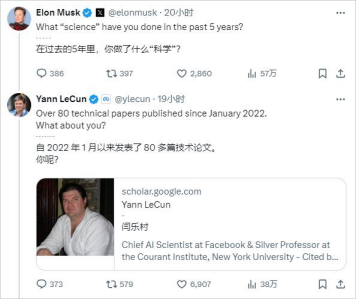
In response, Musk directly lashed out, calling the other party a "softie."

In this feud, many netizens supported Musk, arguing that LeCunn had only published a few papers without actual output or construction, unlike Musk, who has truly created economic value. Ironically, one of LeCunn's numerous papers, introducing convolutional neural networks (ConvNets) in 1989, actually involves the ConvNet used in every driving assistance system, including Tesla.
The fundamental analysis between Musk and LeCunn: Does AI pose a real threat to humanity?
In fact, this is not the first time Musk and LeCunn have clashed.
As early as May 25, the two had already engaged in a subtle online rivalry.
The incident stemmed from OpenAI. Recently, OpenAI has been embroiled in controversy after being exposed for having a tradition of having employees sign non-disparagement agreements upon leaving. Refusal to sign meant giving up previously acquired options at OpenAI.
Naturally, LeCunn sneered at this news, launching a sarcastic attack on OpenAI, urging people to "run away."
Musk, on the other hand, responded with a starkly different "grinning teeth" emoji in a series of replies, taking a rather subtle stance. However, as the incident did not involve him directly, the conflict between the two did not escalate further.

In fact, a careful analysis reveals that both Musk and LeCunn focus on the future development of AI. If one were to summarize their core disagreement in a sentence, it would be: the potential risks and development speed of artificial intelligence.
Musk has consistently emphasized the risks of AI, believing that it could pose a significant threat to humanity, even leading to the "destruction of civilization." Therefore, he advocates for strict regulation of AI development and has called for a moratorium on the development of AI systems more advanced than GPT-4 to prevent potentially catastrophic consequences. He founded xAI with the goal of developing general artificial intelligence (AGI) that can "think" and "reason" and ensuring that these AI systems can be extensions of human will rather than independent, potentially uncontrollable entities, prioritizing safety.
However, in LeCunn's eyes, Musk's claims are alarmist. On the one hand, he believes that AI is far less dangerous than Musk portrays. Rather than replacing humans, AI is helping humans become smarter in doing things on their own. On the other hand, he firmly believes that AI will empower humans with greater power and capabilities. He has always held a disdainful attitude towards the so-called AI threat theory, considering it to be obscurantism. He stated, "Musk and some others may be convinced of an assumption by reading Bostrom's 'Superintelligence' or works by Elias or Yudkowsky. This assumes a hard takeoff. That is, once a super-intelligent AI system is turned on, it will take over the world, break free from your control, make itself even more intelligent, and the world will be destroyed. This is absurd, completely absurd, because there is no such process in the real world."
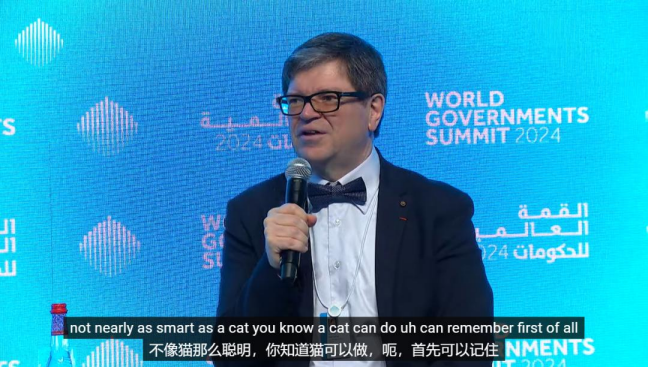
LeCunn also proposed that technological miracles do not appear out of thin air. So-called "miracles" are built on years, even decades, of scientific research. Research ideas and results are communicated through technical papers, and without scientific information sharing, technological progress would be very slow.
It is evident that Musk and LeCunn hold irreconcilable differences in their understanding of AI. So, whose view do you agree with more?







